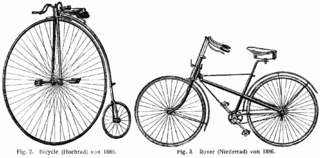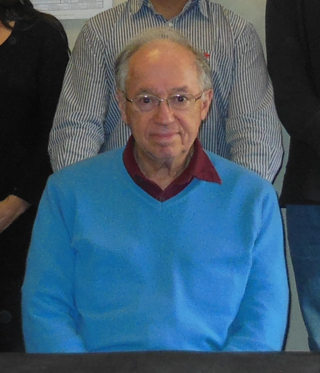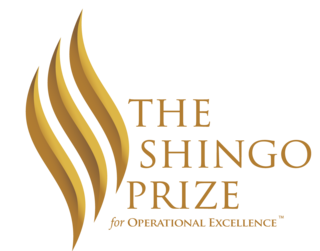
In business theory, disruptive innovation is innovation that creates a new market and value network or enters at the bottom of an existing market and eventually displaces established market-leading firms, products, and alliances. The term, "disruptive innovation" was popularized by the American academic Clayton Christensen and his collaborators beginning in 1995, but the concept had been previously described in Richard N. Foster's book "Innovation: The Attacker's Advantage" and in the paper Strategic Responses to Technological Threats.

Lean manufacturing is a production method aimed primarily at reducing times within the production system as well as response times from suppliers and to customers. It is closely related to another concept called just-in-time manufacturing. Just-in-time manufacturing tries to match production to demand by only supplying goods which have been ordered and focuses on efficiency, productivity and reduction of "wastes" for the producer and supplier of goods. Lean manufacturing adopts the just-in-time approach and additionally focuses on reducing cycle, flow and throughput times by further eliminating activities which do not add any value for the customer. Lean manufacturing also involves people who work outside of the manufacturing process, such as in marketing and customer service.
The Toyota Production System (TPS) is an integrated socio-technical system, developed by Toyota, that comprises its management philosophy and practices. The TPS is a management system that organizes manufacturing and logistics for the automobile manufacturer, including interaction with suppliers and customers. The system is a major precursor of the more generic "lean manufacturing". Taiichi Ohno and Eiji Toyoda, Japanese industrial engineers, developed the system between 1948 and 1975.

Clayton Magleby Christensen was an American academic and business consultant who developed the theory of "disruptive innovation", which has been called the most influential business idea of the early 21st century. Christensen introduced "disruption" in his 1997 book The Innovator's Dilemma, and it led The Economist to term him "the most influential management thinker of his time." He served as the Kim B. Clark Professor of Business Administration at the Harvard Business School (HBS), and was also a leader and writer in the Church of Jesus Christ of Latter-day Saints. One of the founders of the Jobs to Be Done development methodology.

Harvard Business Review (HBR) is a general management magazine published by Harvard Business Publishing, a not-for-profit, independent corporation that is an affiliate of Harvard Business School. HBR is published six times a year and is headquartered in Brighton, Massachusetts.

Kim Bryce Clark is an American scholar, educator, and religious leader who has been a general authority of the Church of Jesus Christ of Latter-day Saints since April 2015, and was the church's seventeenth Commissioner of Church Education from 2015 to 2019. He served previously as the 15th president of Brigham Young University–Idaho from 2005 to 2015, and as the dean of the Harvard Business School (HBS) from 1995 to 2005, where he was also the George F. Baker Professor of Business Administration.

Shigeo Shingo was a Japanese industrial engineer who was considered as the world’s leading expert on manufacturing practices and the Toyota Production System.
Muda is a Japanese word meaning "futility", "uselessness", or "wastefulness", and is a key concept in lean process thinking such as in the Toyota Production System (TPS), denoting one of three types of deviation from optimal allocation of resources. The other types are known by the Japanese terms mura ("unevenness") and muri ("overload"). Waste in this context refers to the wasting of time or resources rather than wasteful by-products and should not be confused with Waste reduction.

Ohno Taiichi was a Japanese industrial engineer and businessman. He is considered to be the father of the Toyota Production System, which inspired Lean Manufacturing in the U.S. He devised the seven wastes as part of this system. He wrote several books about the system, including Toyota Production System: Beyond Large-Scale Production.
The concept of operational excellence was first introduced in the early 1970s by Dr. Joseph M. Juran while teaching Japanese business leaders how to improve quality. It was formalized in the United States in the 1980s in response to "the crisis" among large companies whose market share was shrinking due to quality goods imported from Japan.
Michael E. Raynor is a Canadian writer, director at Deloitte Services LP, and an expert on business management practices.

Norman Bodek was a teacher, consultant, author and publisher who published over 100 Japanese management books in English, including the works of Taiichi Ohno and Dr. Shigeo Shingo, and taught a course on "The Best of Japanese Management Practices" at Portland State University. Bodek created the Shingo Prize with Dr. Vern Beuhler at Utah State University. He also was elected to Industry Week's Manufacturing Hall of Fame and founded Productivity Press, and was President of PCS Press. He died on 9 December 2020 at the age of 88.

Rita Gunther McGrath is an American strategic management scholar and professor of management at the Columbia Business School. She is known for her work on strategy, innovation, and entrepreneurship, including the development of discovery-driven planning.
Mike Rother is an American researcher. He introduced the widespread business practices of Value Stream Mapping and Toyota Kata. He has been affiliated with the Industrial Technology Institute, the University of Michigan College of Engineering, the Fraunhofer Institute for Manufacturing Engineering and Automation (Stuttgart), and the Technical University Dortmund.

Subir Chowdhury is a Bangladeshi-American author of 15 books and noted for his work in quality and management. He is currently the chairman and CEO of ASI Consulting Group, LLC, in Bingham Farms, Michigan.

The Shingo Prize for Operational Excellence is an award for operational excellence given to organizations worldwide by the Shingo Institute, part of the Jon M. Huntsman School of Business at Utah State University in Logan, Utah. In order to be selected as a recipient of the Shingo Prize, an organization "challenges" or applies for the award by first submitting an achievement report that provides data about recent business improvements and accomplishments and then undergoing an onsite audit performed by Shingo Institute examiners. Organizations are scored relative to how closely their culture matches the ideal as defined by the Shingo Model™. Organizations that meet the criteria are awarded the Shingo Prize. Other awards include the Shingo Silver Medallion, the Shingo Bronze Medallion, the Research Award, and the Publication Award.
Dr. Carliss Y. Baldwin is an American economist and the William L. White Professor of Business Administration at Harvard Business School. Her book on modularity in complex technological systems, Design Rules, published in 2000 and co-written with Kim B. Clark, has been called "a landmark book" that has impacted research on organization theory, competitive strategy, and innovation.
Patricia Anne Acquaviva Gabow is an American academic physician, medical researcher, healthcare executive, author and lecturer. Specializing in nephrology, she joined the department of medicine, division of renal diseases, at the University of Colorado School of Medicine in 1973, advancing to a full professorship in 1987; she is presently Professor Emerita. She was the principal investigator on the National Institutes of Health Human Polycystic Kidney Disease research grant, which ran from 1985 to 1999, and defined the clinical manifestations and genetics of the disease in adults and children. She served for two decades as CEO of Denver Health, an integrated public healthcare system in Denver, Colorado, where she implemented numerous business-based systems to streamline operations, improve patient care, and recognize cost savings. In particular, her introduction of the "Lean" quality-improvement system, based on the Toyota Production System, earned her national recognition. She is the author of more than 150 articles and book chapters, three books, and has received numerous awards for excellence in teaching, physician care, and leadership. She was inducted into the Colorado Women's Hall of Fame in 2004.

Management System (Open Source) is a socio-technical system that leverages the cumulative knowledge of management practitioners and evidenced based research from the past 130 years. The system was developed by DoD components in partnership with industry experts and academic researchers and builds off of the US Department of Wars version 1.0 open source management system - Training Within Industry.












